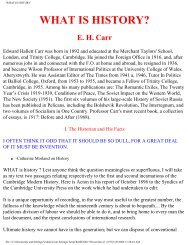The bronze age and the Celtic world - Universal History Library
The bronze age and the Celtic world - Universal History Library
The bronze age and the Celtic world - Universal History Library
You also want an ePaper? Increase the reach of your titles
YUMPU automatically turns print PDFs into web optimized ePapers that Google loves.
134<br />
THE BRONZE AGE AND THE CELTIC WORLD<br />
speech must have been spoken originally by a small group of people, <strong>the</strong> primitive<br />
Aryans, or, as we shall call <strong>the</strong>m, <strong>the</strong> Wiros. But owing to loose thinking all <strong>the</strong> people<br />
who speak <strong>the</strong>se langu<strong>age</strong>s to-day, as well as those who have spoken <strong>the</strong>m in <strong>the</strong> past,<br />
were considered Aryans, <strong>and</strong> it was assumed that because <strong>the</strong>ir langu<strong>age</strong>s were related<br />
<strong>the</strong>y were racially identical. As long as this apphed only to European peoples no one<br />
raised any protest, but when Max-Miiller asserted that <strong>the</strong> same blood runs in <strong>the</strong> veins<br />
of EngUsh soldiers as in <strong>the</strong> veins of <strong>the</strong> darkest Bengalese,' <strong>the</strong> Nordic spirit in this<br />
country, which, as we have seen, is prone to race exclusiveness, rose in its wrath, <strong>and</strong><br />
<strong>the</strong> whole generalisation was questioned.<br />
It was <strong>the</strong>n shown that langu<strong>age</strong>s could be imposed by conquerors upon <strong>the</strong>ir<br />
subjects, <strong>and</strong> that <strong>the</strong>re were instances on record of <strong>the</strong> reverse process taking place,<br />
as in <strong>the</strong> case of <strong>the</strong> Prankish invaders of Gaul <strong>and</strong> <strong>the</strong> Viking settlers in Norm<strong>and</strong>y.<br />
People <strong>the</strong>n, with equal lack of lucid thinking, ran to <strong>the</strong> opposite extreme <strong>and</strong> said,<br />
" <strong>the</strong>re is now no Aryan race, <strong>and</strong> <strong>the</strong>re never has been one." To Penka* is due <strong>the</strong><br />
credit of making <strong>the</strong> matter clear. He pointed out that Aryan blood is not co-extensive<br />
with Aryan speech. He showed that those who use <strong>the</strong> latter are of several distinct<br />
anthropological types, but he argued that <strong>the</strong> primitive Aryans or Wiros must have<br />
been of one type.<br />
Penka's contention seems eminently reasonable <strong>and</strong>, one would think,<br />
incontrovertible, for a group of langu<strong>age</strong>s, so closely resembling one ano<strong>the</strong>r, must<br />
have grown up in a somewhat restricted area, among a people who had, during <strong>the</strong><br />
formative period of <strong>the</strong> langu<strong>age</strong>, httle intercourse with <strong>the</strong> outside <strong>world</strong>. <strong>The</strong> very<br />
conditions which would produce a speciaUsed type of langu<strong>age</strong>, would, we may feel<br />
sure, have produced an equally speciahsed type of men, that is to say, a race in <strong>the</strong><br />
anthropological meaning of <strong>the</strong> term.<br />
<strong>The</strong> failure of Penka's views to carry widespread conviction was, I am inchned<br />
to think, due to <strong>the</strong> fact that his <strong>the</strong>ory involved <strong>the</strong> identification of <strong>the</strong> primitive<br />
Wiros with <strong>the</strong> Nordic race. <strong>The</strong>re is really no vaMd objection to this view, <strong>and</strong>, as will<br />
be seen later, <strong>the</strong> evidence which I am adducing points to a similar conclusion. But,<br />
unfortunately, this <strong>the</strong>ory became associated with certain poUtical opinions, <strong>and</strong> so<br />
became distasteful to those with a different outlook.<br />
5 Max-MiiUer (1855) 29. « Penka (1883, 1886).







